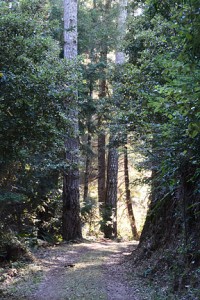The Language of Plants
Have you ever wondered whether trees talk to each other about what’s going on in the forest? Can they show compassion or motherly love? Do they team up to ward off an attack?
Recent research has shown that plants communicate using an electrochemical “language.” Taking a break from exploring my old black filing cabinet, I’d like to share a poem about this discovery. It’s from my new collection, Earthward, available from Finishing Line Press.
The Language of Plants
We who move about are at a loss.
We do not know what words to use
for speech that has no metaphor
in the human tongue.
We have ways to speak of learning,
words for memory, decision-making words.
We speak of synapses of neurons in our brains,
name the organs that receive our senses—
ears, eyes and noses, taste buds, fingertips—
words all based on human forms.
The standing-still ones
message their pheromones into the air:
Aphid invasion. Deploy toxin defenses.
Send for the predator wasp to counter-attack.
Roots zing with electrochemical charge
as through their internet—
a mycorrhizal tangle of yellow threads—
they share resources with their kin,
and even with neighbors of other ilk:
Fir borrows summer sugar from birch,
pays it back in the time of barren twigs.
We need new definitions to embrace
the beings who feed on light
not in some alien galaxy
but close at hand:
Does intelligence mean to have a brain
or problem-solve?
New ways of standing in a bean patch
or a forest grove
in awe and wild surmise at all
this human brain can not yet comprehend.

In Miami, thick tree roots crawl out over walls, fit themselves into crevices, curl sinuously around any obstacle. Walking, I wonder how we look to them, moving so fast in our time, we must be a blur. And I wish I could, for a moment, slow down to theirs and see them move.
Having recently walked a few steps in your footprints—I think, perhaps, even where Tony’s photo was taken—I can better appreciate how you might come to write “The Language of Plants.”
I like everything about the poem, including the question you pose at the end. But to focus on a couple interesting lines, I chose these and the image they evoke because you did, indeed, find an appropriate metaphor in the human language:
Roots zing with electrochemical charge
as through their internet—
But I confess that I had to look up mycorrhizal in the lines that followed:
a mycorrhizal tangle of yellow threads—
they share resources with their kin,
and even with neighbors of other ilk:
Then at the end, your words gave such perfect expression to my feelings as I walk outside. Now I know how I feel!
in awe and wild surmise at all
this human brain can not yet comprehend.
Thank you for sharing this poem from your most recent collection, Maureen. I look forward to reading the others in the collection. And thanks for signing my copy!
Mycorrhiza
/?ma?k??ra?z?/
noun (pl) -zae (-zi?), -zas
1.
an association of a fungus and a plant in which the fungus lives within or on the outside of the plant’s roots forming a symbiotic or parasitic relationship.
Yes! Thank you. “New ways of standing.”
One of my favorites!